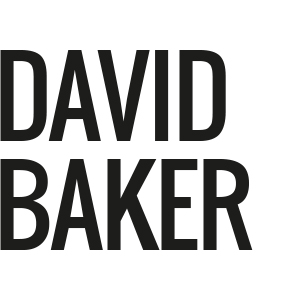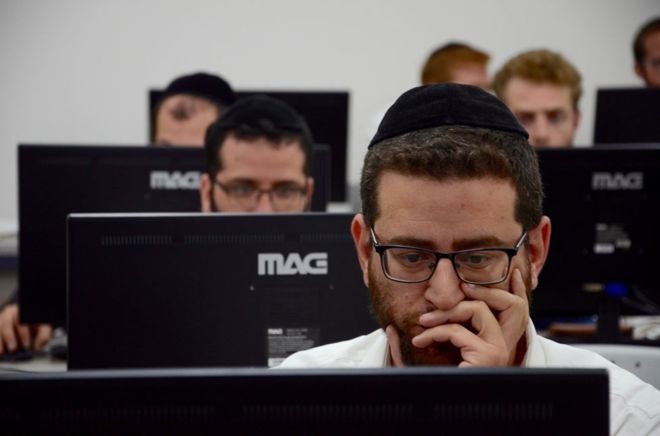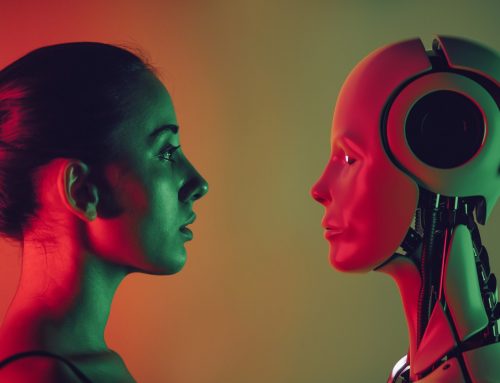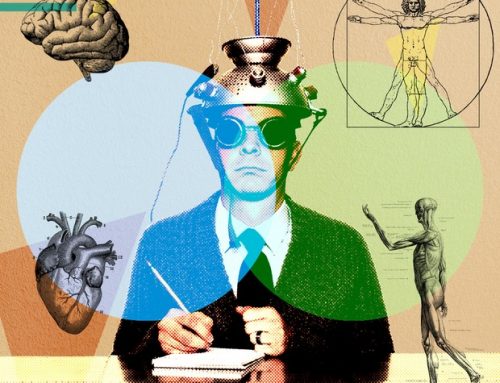Israel’s ultraorthodox Jews are getting jobs as coders
BBC Online magazine, 9 September 2016
Learning the Talmud involves wrapping our minds around a certain problem and looking at it from different approaches and trying to find different solutions,” says Moshe Slaven, a 26-year-old Haredi man from Jerusalem, who is learning how to code. “Programming is very similar, especially the way of thinking.”
Like many of his friends, Slaven grew up expecting a life of quiet learning. Haredi men are expected to spend most of their time studying the Torah and Talmud, Judaism’s sacred texts, leaving their wives to go out and work. About half of Israel’s Haredi men live this way.
But while the cost of living has risen in recent years, child benefit has been cut – bad news for Haredi families, which often have eight-to-10 children and rely on benefits to make ends meet.
As a result, more Haredi men are looking for work and, like Slaven, turning to Israel’s booming high-tech sector.
Israel is known as the “start-up nation”. Its technology sector is considered by many to be second only to Silicon Valley and it needs more coders and developers.
Technology may not seem the obvious choice for ultra-Orthodox men who have had very little or no training in science or maths – Israel’s Haredi schools don’t teach these subjects – let alone English, the lingua franca of tech meet-ups around the world.
But it involves skills they can learn relatively quickly – whether or not it’s true, as Moshe Slaven suggests, that religious scholarship is a good preparation. They don’t need to spend years studying for a qualification and when they get a job the pay tends to be good.
The world of tech meet-ups and venture capital funding rounds is very different from the inward-looking, religious life of the Haredim, though, and integrating can be challenging says Yoni Reiss, a Haredi coder who has worked for a number of tech companies.
“We don’t eat the same food, we don’t drink the same wine, we don’t go to the same places. If you have a co-worker that has a party in this restaurant or this club, it’s not the place you would show up. So it’s never so easy socially to integrate in a secular company.”
Which is where Moshe Friedman comes in. Friedman is a rabbi-turned-tech-entrepreneur, who runs Kamatech, an organisation that brings together ultra-Orthodox start-ups with often very secular investors.
Friedman grew up in the Haredi community and when he started in tech, he felt very much the outsider.
“I met with a lot of secular people and I realised they were looking at me like I was coming from a different planet, like someone from the Middle Ages,” he says. “They really didn’t believe that I had any chance to do something meaningful in the hi-tech field.”
But, motivated by his family history, he is committed to improving integration between the Haredi and the rest of Israeli society. Friedman’s great-grandfather was the Chief Rabbi of Jerusalem, and it was he who banned maths, science and English from Haredi schools.
“He thought that religion and tradition should be protected from outside influence. That was 100 years ago, and he succeeded. So thanks to my great-grandfather, there are today in Israel one million ultra-Orthodox people, about 12%, who are not connecting to science, not speaking English. I feel a kind of a mission to fix what my great-grandfather did.”
Not everyone agrees with Friedman’s vision. Many in the Haredi community see secularism as a threat to the very existence of ultra-Orthodox Judaism. And they are particularly worried by the dangers of engaging in the world of high-tech and, especially, the internet.
“[The internet] is a catastrophe,” says Rabbi Mordecai Blau, chairman of the Guardians of Sanctity and Education in the Rabbinic Courts of Bnei Brak, an almost exclusively ultra-Orthodox town just east of Tel Aviv.
“There are families that have fallen apart because of the internet, because a community that’s used to living a secluded life has suddenly discovered a new world on the internet. It’s liberal, open and it’s a terrible danger.”
Others are more confident of keeping their religious life alive while working in the Israeli mainstream, though. Chedva Kleinhandler is a Haredi woman who runs a start-up called Lean On, which helps people find mentors to advise them in their careers. She lives an ultra-Orthodox life in Bnei Brak but her co-workers are non-religious Israelis and her start-up is based inside the Microsoft office in Herzliya – the Palo Alto of Israel and just as secular.
It’s perfectly possible, she says, to maintain a Haredi identity in a non-religious world of work.
During the week, Kleinhandler is as connected as any plugged-in teenager, constantly checking her phone and ignoring Blau’s concerns about the internet.
“I’m a workaholic,” she says, “and even when I go on vacation I take my laptop and my iPhone and my iPad and I’m connected on my WhatsApp and my Messenger and everything. And if something happens everyone can find me.”
But on Friday nights, when the Sabbath, or Shabbat, begins and observant Jews are forbidden to use electronic equipment, she disconnects completely.
“I shut off my phone a second before Shabbat – it’s extremely hard for me. But it’s the original digital detox.
“Being religious, being observant, being ultra-Orthodox is something that is inside you in everything you do – in your business, in your meetings, in your interactions, in your food. I love being integrated, but it’s very important to me and to our community to maintain our religious integrity.”
Kleinhandler admits that she has had to work hard to understand the secular culture she now works in.
“When you’re a minority you always need to know the majority’s language, the manners, what’s the common way to act,” she says. “You need to be fluent at it to do well and not stick out.”
And, she says, it would be wonderful to see secular Israelis making more of an effort to integrate with her.
“Sometimes I wish there was someone who would understand the world I come from as well as I understand other people’s worlds.”
Israel’s Haredim
- Haredim, or ultra-Orthodox Jews, make up about 11% of Israel’s population, and often live in exclusively ultra-Orthodox neighbourhoods or towns
- Men wear white shirts, black trousers, long black coats and black hats – clothing that comes from the 18th Century Jewish communities of Russia and Poland
- Women wear clothing that covers their elbows and knees, and many married women wear a wig so as not to show their natural hair, for reasons of modesty
- Many Haredi homes have no television or internet and often no non-religious books or music
- Haredi children spend most of their education studying the Torah, the Hebrew bible, and the Talmud, a long and elaborate biblical commentary – men are expected to continue this study throughout their lives






